April 19, 2025 | 20:05 GMT +7
April 19, 2025 | 20:05 GMT +7
Hotline: 0913.378.918
April 19, 2025 | 20:05 GMT +7
Hotline: 0913.378.918
Gia Lai Province boasts over 1.5 million hectares of natural land area, making it the second largest nationwide after Nghe An. Notably, agricultural land accounts for more than 1.4 million hectares of this area. The region is also home to the Pleiku and Kon Ha Nung Plateaus, both of which feature fertile basalt soil and a tropical monsoon climate. These factors are a critical foundation for agricultural development, particularly in coffee cultivation.
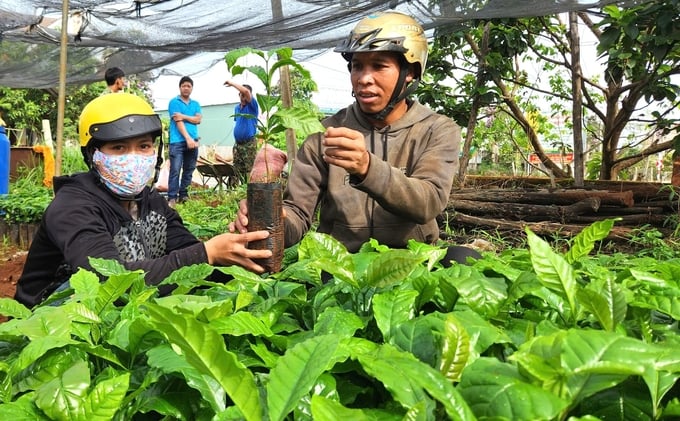
Selecting high-quality varieties for coffee replanting in Gia Lai. Photo: Dang Lam.
With over 105,000 hectares of acreage, coffee remains a cornerstone crop of Gia Lai's agricultural economy. Accordingly, coffee is the main crop of 10 districts and cities within the province, with nearly 60,000 hectares produced under various certifications, including VietGAP, 4C, RA, C.A.F.E. Practices, and Organic standards. With Robusta as the primary cultivar, Gia Lai’s coffee farms yield an average of 3.9 tons per hectare, producing more than 400,000 tons annually. Additionally, the province has exported its coffee products to 60 countries worldwide.
In 2023, Gia Lai's coffee exports generated over 490 million USD in revenue, predominantly from green coffee beans. Notably, deep-processed coffee accounts for 6% of this total. During the first nine months of 2024, agricultural exports from the province reached an estimated 700 million USD, achieving over 93% of the annual target. Gia Lai's coffee exports amounted to 193,000 tons with a total value of 552 million USD. Accordingly, coffee accounts for 80% of the province's total agricultural export revenue. This growth marks an increase of 26% compared to the corresponding period in 2023.
Coffee farming has significantly contributed to poverty alleviation and improved livelihoods across Gia Lai, thereby fostering sustainable household economies. Multiple local farmers have achieved prosperity. Moreover, remote and underdeveloped rural areas, such as Ia Sao and Ia H’rung (Ia Grai District) or Ia Mo Nong (Chu Pah District), have transformed into thriving communities.
In response to the volatile domestic and global coffee markets, Gia Lai Province introduced comprehensive policies for its coffee industry with the aim of promoting sustainable development and combating deforestation and climate change.
Under the provincial agricultural restructuring plan for 2030, Gia Lai aims to maintain a stable coffee production area of approximately 100,000 hectares, with 15.03% transitioning to organic production. The province also plans to develop coffee areas with a focus on landscape preservation, integrating coffee cultivation with cultural, tourism, and service development in favorable locations.
Ia Grai District, one of Gia Lai’s key coffee-producing regions, currently houses approximately 18,000 hectares of coffee acreage, with over 17,000 hectares available for harvest. According to Phan Dinh Tham, Head of the local Department of Agriculture and Rural Development, the district’s policy focuses on maintaining its existing coffee area in addition to prioritizing organic and sustainable farming practices.
Focusing on sustainable intensive farming and deep processing
To maintain 100,000 hectares of coffee acreage by 2030, Gia Lai Province has conducted a review of low-yielding coffee farms in unfavorable areas, with an emphasis on regions facing water scarcity. Consequently, the province is converting these areas to alternative crops with higher economic value and efficiency.
The province is also promoting the replanting of aging coffee farms and the use of high-yield, high-quality, and pest-resistant coffee varieties. On the other hand, Gia Lai is adopting the practice of intercropping coffee with perennial industrial and fruit trees and implementing Vietnam’s specialty coffee development plan.
By 2030, Gia Lai aims to house at least 2,340 hectares of specialty Robusta coffee acreage, yielding 1,700 tons of high-quality specialty coffee. This initiative highlighted the province's commitment to enhancing the sustainability and economic value of its coffee industry.
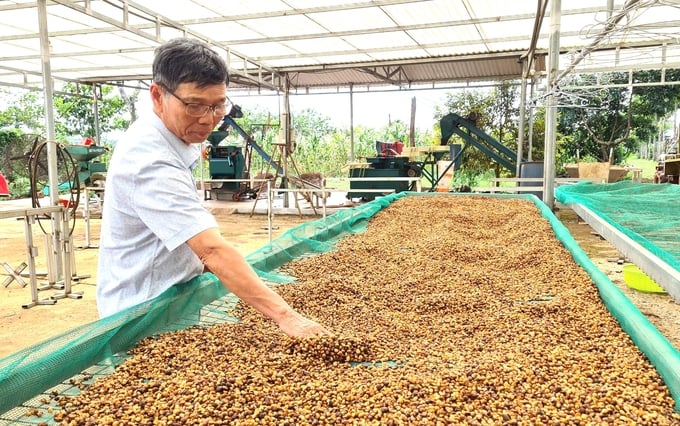
Gia Lai Province has implemented numerous policies to improve coffee production quality, including investments in equipment and drying yards. Photo: Dang Lam.
The province emphasizes sustainable farming practices, such as intensive farming to boost productivity, adopting advanced water-saving irrigation techniques, planting windbreaks and shade trees, pruning, and creating coffee landscapes. Mechanization in harvesting and certified coffee production are also priorities within the province's development plan.
By 2030, Gia Lai aims to convert 2% of its coffee acreage to organic production and dedicate over 2% to specialty coffee production. Additionally, more than 80% of the coffee-producing area is expected to meet production standards such as VietGAP, 4C, RA, C.A.F.E. Practices, and Organic certifications. Over 70% of the local coffee acreage will receive a production unit code to ensure traceability and compliance with the EU Deforestation Regulation (EUDR), which supports deforestation-free coffee production.
Rah Lan Chung, Chairman of the Gia Lai Provincial People’s Committee, stated, “To improve our deep processing capabilities and develop the local logistics system, Gia Lai is focusing on several key tasks: ensuring 80 to 90% of the locally harvested coffee products meet optimal ripeness and quality standards; maintaining cleanliness across all stages of harvesting, drying, preliminary processing, and storage; and supplying high-quality raw coffee to enhance export and domestic market quality.”
In addition to promoting sustainable farming within its existing coffee acreage, Gia Lai is gradually developing local coffee processing industries and diversifying its product offerings, with a focus on deep processing to enhance quality, increase value, and establish a unique identity for local coffee products.
Key initiatives include encouraging investments in modernizing coffee processing plants for roasted, ground, and instant coffee production. By 2030, the province expects deep-processed coffee to account for between 20 and 25% of the province's total yield, with export volumes accounting for approximately 85%, roasted coffee 6%, and instant coffee 20%.
Chairman Rah Lan Chung also emphasized the importance of upgrading drying and processing systems, particularly for dry-processed coffee. Notably, the province will encourage local farmers to collaborate on medium-scale coffee processing and adopt semi-wet processing methods for Robusta coffee to ensure high-quality raw materials for subsequent processing stages.
Translated by Nguyen Hai Long
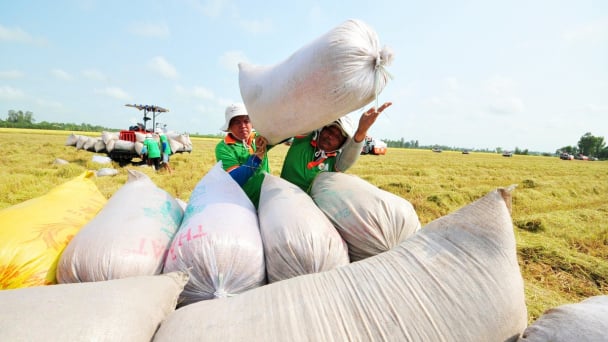
(VAN) The rice industry in the Mekong Delta is undergoing a major transformation, shifting toward sustainable, high-quality, and low-emission exports to meet the green and clean standards increasingly demanded by international markets.
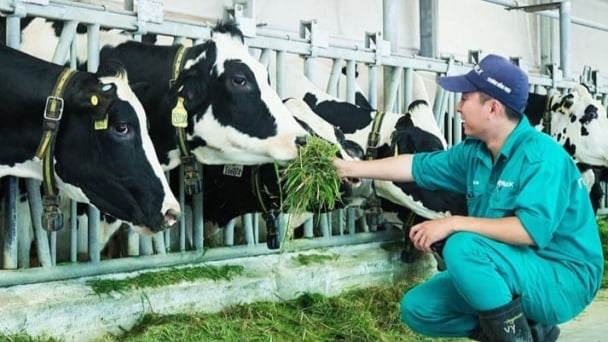
(VAN) According to Tong Xuan Chinh, Deputy Director of the Department of Livestock Production and Animal Health, Vietnam’s dairy cattle industry must overcome seven major challenges to achieve sustainable development.
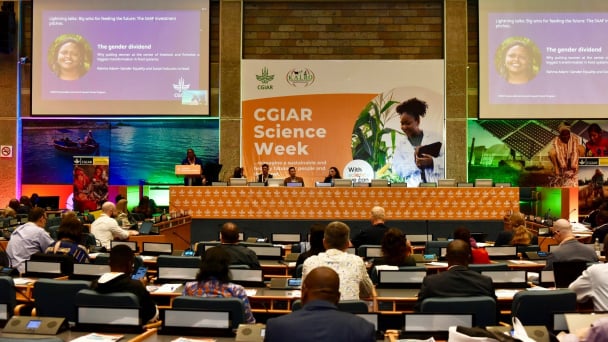
(VAN) The CGIAR’s Sustainable Animal and Aquatic Foods (SAAF) program represents a new approach that emphasizes the transformation of food systems toward sustainability.
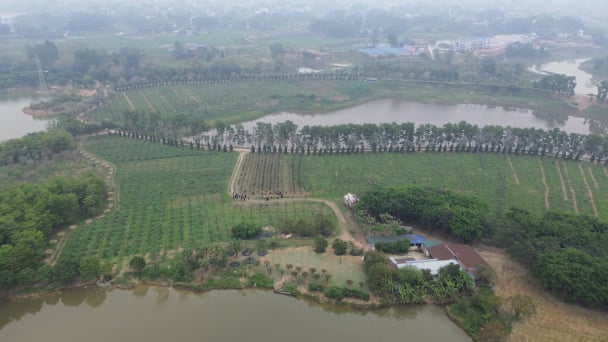
(VAN) Scientists assume that industrial agriculture has been 'outdated.' As a result, a comprehensive overhaul or a revolution in the direction of embracing ecological agriculture is needed.
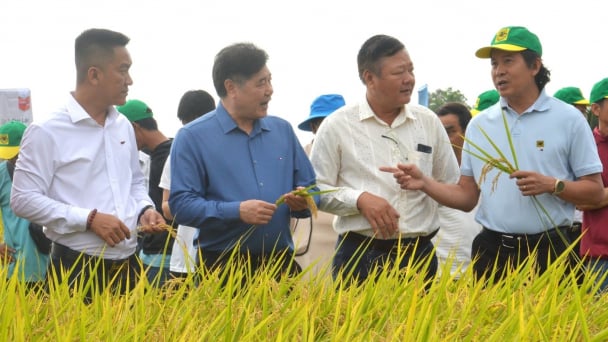
(VAN) The results from pilot fields are catalyzing the expansion of the One million hectares of high-quality, low-emission rice project in Kien Giang.
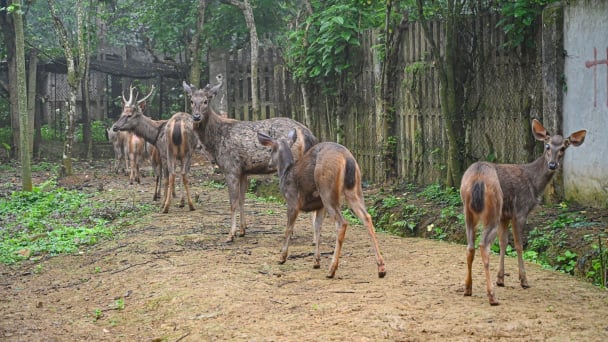
(VAN) On the morning of April 11, Cuc Phuong National Park received 18 individuals of endangered and rare wild animals from Da Nang city.
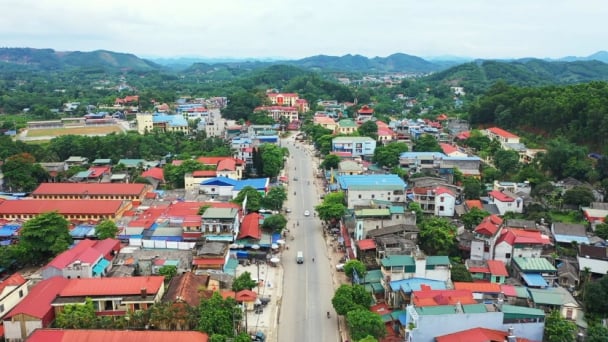
(VAN) FAO supports Vietnam in enhancing survey sampling techniques for the 2025 nationwide agricultural and rural census.